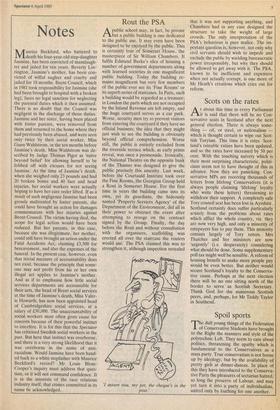Rout the PSA
Apublic school may, in fact, be private but a public building is one dedicated to the public use. It may even have been designed to be enjoyed by the public. This is certainly true of Somerset House, the masterpiece of Sir William Chambers. It fulfils Edmund Burke's idea of housing a number of government departments along with learned societies in one magnificent public building. Today the building re- mains magnificent but very few members of the public ever see its 'Fine Rooms' or its superb series of staircases. In Paris, such a building would be regarded as a treasure; in London the parts which are not occupied by the Inland Revenue are left empty, and the huge courtyard serves as a car park. Worse, security men try to prevent visitors from entering the courtyard if they have no official business; the idea that they might just wish to see the building is obviously beyond official comprehension. Worse still, the public is entirely excluded from the riverside terrace which, as early prints reveal, was once a promenade. Ironically, the National Theatre on the opposite bank of the Thames was designed to give the public precisely this amenity. Last week, before the Courtauld Institute took over the Fine Rooms, the Georgian Group held a Rout in Somerset House. For the first time in years the building came into its own, yet its guardians, the hideously named 'Property Services Agency' of the Department of the Environment, did all in their power to obstruct the event after attempting to renege on the contract signed by the Group. Finally,, the day before the Rout and without consultation with the organisers, scaffolding was erected all over the staircase the routers would use. The PSA claimed this was to strengthen it, although inspection revealed
the my pet, the cheque's in post.'
that it was not supporting anything, and Chambers had in any case designed the structure to take the weight of large crowds. The only interpretation of the PSA's behaviour is pure malice. The im- portant question is, however, not only why civil servants should wish to impede and exclude the public by wielding bureaucratic power irresponsibly, but why they should be allowed to get away with it. The PSA, known to be inefficient and expensive when not actually corrupt, is one more of Mr Heath's creations which cries out for reform.










































 Previous page
Previous page